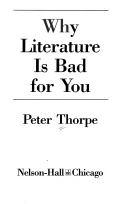Literature Asks Questions without Offering Answers
Even when writers profess to know nothing about the inner man, they often make the profession in a way which suggests that they really know plenty When D. H. Lawrence says (in his essay on Benjamin Franklin) "The soul of man is a dark forest," he says it with a kind of knowing Satanic smirk, so that the profession of ignorance actually becomes a species of knowledge. When I first read that ominous Lawrence sentence I was young and it was news to me that my soul was a dark forest. For several days I went around with this crushing insight on my mind, until I read some other author, who sent me off in a new direction. When I was a student it seemed as though the only thing I changed more often than my Philosophy of Life was my socks. But through all of my philosophical bypaths and crooked ways, two things consistently stayed with me: my conviction that self-knowledge was crucial and my opinion that it was to be found in the great masterpieces of English literature. Sadder and I hope wiser now, I no longer cleave to either of these views. I don't think that literature can do what psychiatry is supposed to do, and even if it could, it shouldn't.
What does literature do? I believe the infectious energies of great works of art have a way of instilling in us a drive to acquire self-knowledge, but I doubt that such a drive is a virtue, especially when art, which makes us itch with questions, gives us so few answers. Thus a common ailment among those who make a career of letters is an annoying restlessness something like the dementia praecox that we all should have outgrown long ago. But the main trouble with the excessive soul-searching that art inspires in us is not that it yields no answers but that it results in selfcenteredness.
Notes:
Folksonomies: literature philosophy humanities
Taxonomies:
/art and entertainment/books and literature (0.599509)
/finance/investing (0.351366)
/health and fitness/disorders/mental disorder/panic and anxiety (0.330428)
Keywords:
ominous Lawrence sentence (0.946665 (negative:-0.658085)), dark forest (0.933332 (negative:-0.523065)), D. H. Lawrence (0.914776 (neutral:0.000000)), Literature Asks Questions (0.913999 (neutral:0.000000)), Satanic smirk (0.686009 (positive:0.230912)), Benjamin Franklin (0.632538 (neutral:0.000000)), annoying restlessness (0.628727 (negative:-0.880068)), inner man (0.625982 (neutral:0.000000)), dementia praecox (0.615327 (negative:-0.880068)), crooked ways (0.613071 (neutral:0.000000)), common ailment (0.607073 (negative:-0.880068)), new direction (0.602523 (positive:0.294033)), great masterpieces (0.597755 (positive:0.467698)), philosophical bypaths (0.591812 (neutral:0.000000)), art inspires (0.586756 (negative:-0.684300)), infectious energies (0.586629 (positive:0.836568)), English literature (0.585428 (positive:0.467698)), main trouble (0.583979 (negative:-0.684300)), great works (0.567634 (positive:0.836568)), self-knowledge (0.466062 (positive:0.652133)), answers (0.457802 (negative:-0.684300)), profession (0.418928 (neutral:0.000000)), soul (0.413812 (negative:-0.523065)), drive (0.383072 (positive:0.683805)), ignorance (0.382138 (neutral:0.000000)), conviction (0.367104 (positive:0.467698)), virtue (0.358555 (positive:0.531041)), Offering (0.358109 (neutral:0.000000)), writers (0.358040 (neutral:0.000000)), essay (0.357472 (neutral:0.000000))
Entities:
D. H. Lawrence:Person (0.930185 (negative:-0.658085)), Benjamin Franklin:Person (0.643093 (neutral:0.000000)), selfcenteredness:City (0.544981 (neutral:0.000000))
Concepts:
Benjamin Franklin (0.943378): website | dbpedia | freebase | opencyc | yago
Art (0.916093): dbpedia | freebase
Question (0.891886): dbpedia | freebase
Philosophy (0.866158): dbpedia | freebase | opencyc
English-language films (0.815850): dbpedia
Sentence (0.731121): dbpedia | freebase | yago
Mind (0.709399): dbpedia | freebase | opencyc
Soul (0.659102): dbpedia | freebase





